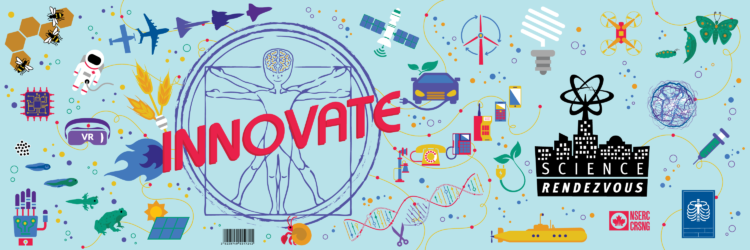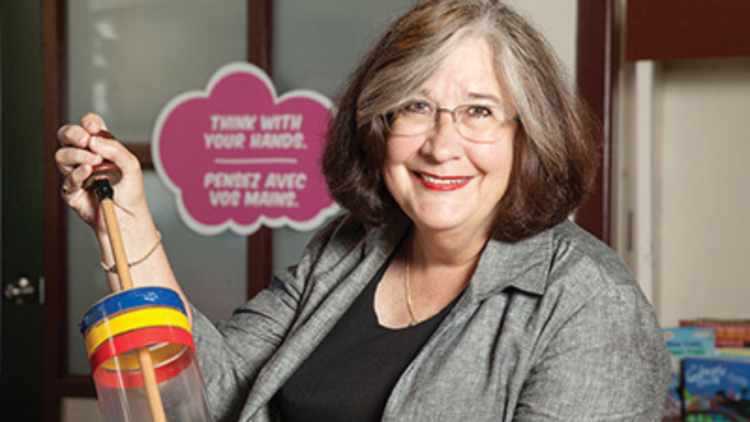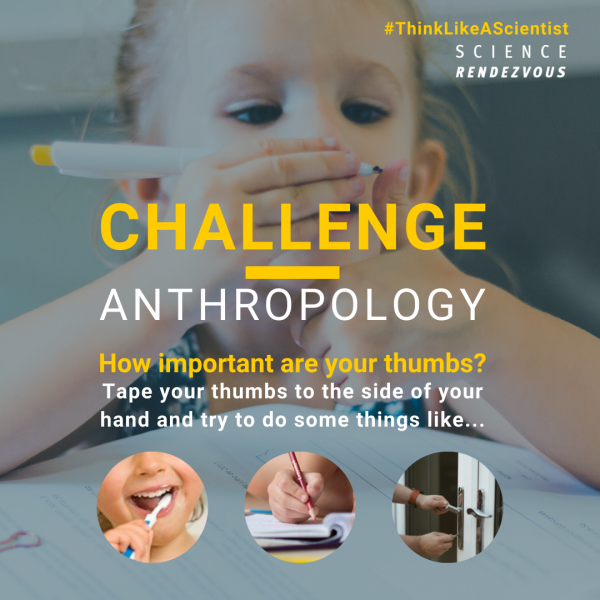
We thank Jodi Schmidt for providing resources and input for this activity and the information that follows about anthropology.
Challenge
This week, we challenge you to think like an anthropologist with the #NoThumbsChallenge! Bioanthropologists look at how humans have evolved and sometimes that means studying modern and ancient human traits, like opposable thumbs! Tape your thumb to the side of your hand and try to do some tasks around the house. What do you notice?
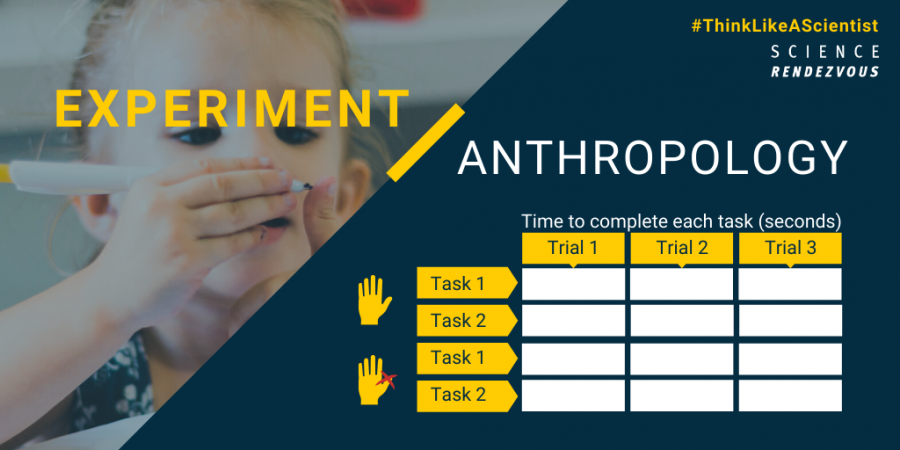
If you want an additional challenge, time yourself doing the same tasks several times with and without thumbs and record it in this table!
What is anthropology?
Anthropology studies humans, past and present, as well as our closest related species, the primates, including lemurs, monkeys and apes.
“Anthropologists want to know why things happen…[and] tackle big human problems, such as overpopulation, warfare and poverty.”
American Anthropological Association
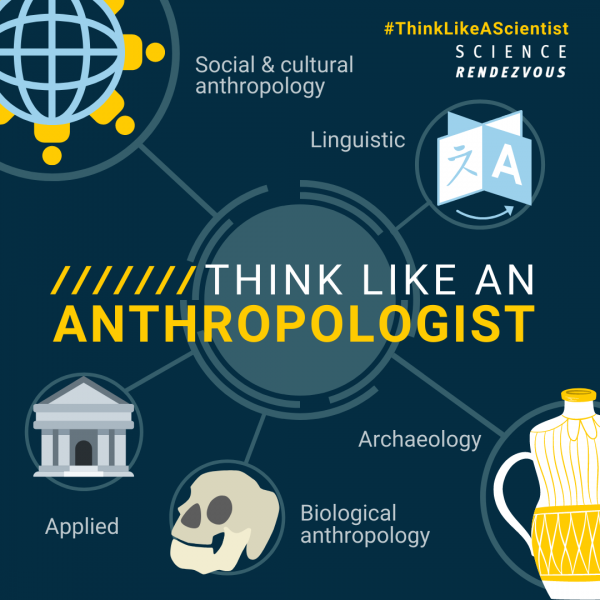
Anthropology is divided into 5 subfields:
- Social and cultural anthropology: focuses on culture and societies around the world
- Archaeology: studies human societies through material remains
- Biological anthropology: examines human evolution and biology
- Linguistic: investigates human language with specialized methods that record and analyze languages around the world and how it’s used in everyday life
- Applied: Uses anthropology and applies it to tasks in public and private sectors
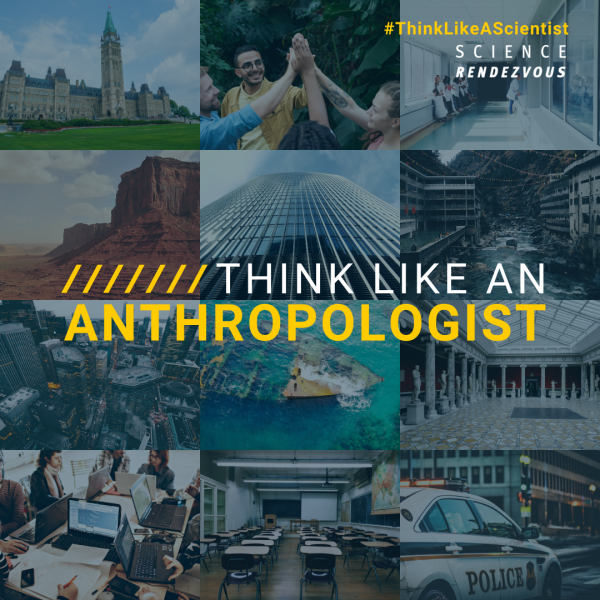
As a career, anthropologists can work in a variety of settings and workplaces. Here are some examples:
- Federal, provincial and local governments
- Healthcare centers
- Research institutes
- Businesses
- Excavation sites
- Cities
- Schools
- Underwater archaeological sites
- Disaster areas
- Museums
- Police Departments
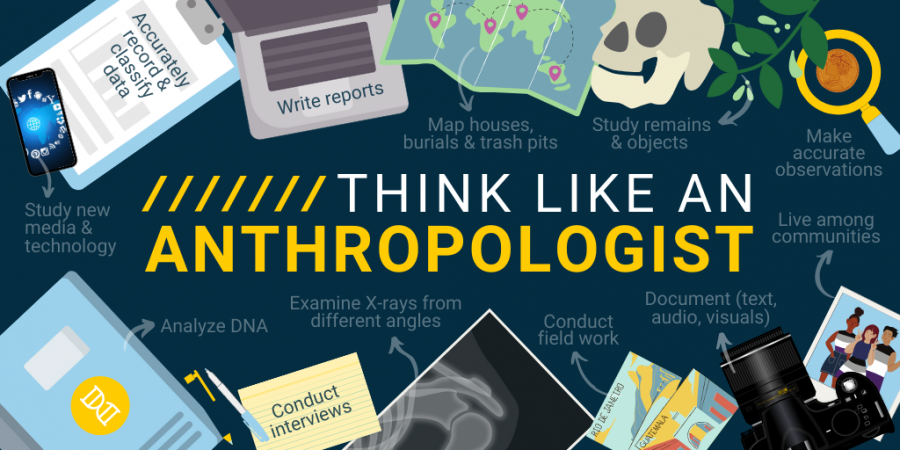
Anthropologists also conduct a lot of research using a variety of different specialized methods, depending on which sub-field they work in. They all rely on fieldwork, such as excavation of ancient societies or interacting with modern social groups. This is why training is very important in becoming an anthropologist. The methods anthropologists use include:
- Fieldwork, often living with the communities you are studying with for a year or more to establish good relations and to be thorough and accurate in recording what people say and do
- Observation, often daily and detailed, as well as important events and situations such as economic activities, social relationships and spiritual acts. Observation involves participant-observation, where anthropologists participate in the everyday life of the people they are studying–this enhances understanding and reveals the purpose of local institutions, culture and practices
- Interviewing to gain information with accurate detail and completeness
- Documenting with textual, visual, auditory records
- Studying skeletal remains, and remains of objects that people created, modified or used through excavation
- Mapping the locations of houses, trash pits, and burials
- Collecting the remains of plants, animals, and soils from the places where people have lived
- Using CT scanners, which are essentially taking X-rays from different angles
- Analyzing DNA
- Studying new media platforms and digital technologies, such as Facebook and YouTube
- Learning about other primates and the fossils of human ancestors
- Accurately recording and classifying data
- Writing accurate and appropriate scientific reports
- Collaborating with people using different skills to gain a more comprehensive understanding.
Anthropologists must have strong social skills, be honest and courteous, and follow the ethical principles of anthropology and of the people group they are living with and studying. It is very important to be aware of biases, particularly the habit of seeing all cultural groups as inferior to another, usually their own, cultural group.
Learn more about opposable thumbs:
- https://www.amnh.org/exhibitions/permanent/human-origins/understanding-our-past/living-primates/the-grasping-hand
- https://www.ncbi.nlm.nih.gov/pmc/articles/PMC1571064/
- https://www.newscientist.com/article/dn11047-birdlike-dinosaur-boasted-opposable-fingers/
- https://daily.jstor.org/why-do-pandas-have-thumbs/
- https://www.nature.com/articles/ncomms8717
Learn more about anthropology:
- https://www.cas-sca.ca/news-and-announcements/anthropology-in-canada
- https://www.americananthro.org/AdvanceYourCareer/Content.aspx?ItemNumber=2148
- https://www.americananthro.org/AdvanceYourCareer/Content.aspx?ItemNumber=2150
- https://www.thecanadianencyclopedia.ca/en/article/anthropology
- https://www.nationalgeographic.org/encyclopedia/anthropology/
- https://www.nationalgeographic.org/media/history-branches-anthropology/?utm_source=BibblioRCM_Row
- https://daily.jstor.org/pub_tag/current-anthropology/
- https://humanorigins.si.edu/
- https://www.amnh.org/explore/ology/anthropology#all
- https://www.penn.museum/athome/anthropology/

